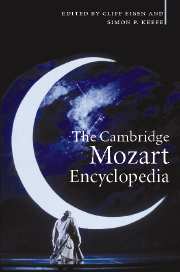Book contents
- Frontmatter
- Contents
- Contributors
- Preface
- A–Z general entries
- A
- B
- C
- D
- E
- F
- G
- H
- I
- J
- K
- L
- M
- N
- O
- P
- R
- S
- T
- U
- V
- W
- Z
- Appendix 1 Worklist
- Appendix 2 Mozart movies (theatrical releases)
- Appendix 3 Mozart operas on DVD and video
- Appendix 4 Mozart organizations
- Appendix 5 Mozart websites
- Index of Mozarts works by Köchel number
- Index of Mozarts works by genre
- General index
S
from A–Z general entries
Published online by Cambridge University Press: 05 June 2012
- Frontmatter
- Contents
- Contributors
- Preface
- A–Z general entries
- A
- B
- C
- D
- E
- F
- G
- H
- I
- J
- K
- L
- M
- N
- O
- P
- R
- S
- T
- U
- V
- W
- Z
- Appendix 1 Worklist
- Appendix 2 Mozart movies (theatrical releases)
- Appendix 3 Mozart operas on DVD and video
- Appendix 4 Mozart organizations
- Appendix 5 Mozart websites
- Index of Mozarts works by Köchel number
- Index of Mozarts works by genre
- General index
Summary
Salieri, Antonio (b. Legnago, 18 Aug. 1750; d. Vienna, 7 May 1825). An Italian musician resident in Vienna, he played a crucial role in the evolution of Viennese opera during thirty-five years as composer and conductor. Florian Gassmann, music director of the Viennese court theatres, brought Salieri from Venice to Vienna in 1766. The sixteen-year-old orphan's charm and musicality won the patronage of Joseph II, under whose protection his education and career flourished. From 1770 to 1804 he wrote many operas for the court theatres and fulfilled commissions in Italy, Munich and Paris. In 1788 Joseph appointed him Hofkapellmeister, a position he occupied for the rest of his career.
Salieri probably came into contact with Mozart for the first time in 1768, when Leopold Mozart and Wolfgang stayed in Vienna for several months and Wolfgang composed La finta semplice in the vain hope of having it performed in the court theatres. On his next trip to Vienna, in 1773, Mozart must have heard Salieri's comic opera La locandiera, which was performed frequently during Mozart's residence in the capital. Another opera by Salieri Mozart knew was La fiera di Venezia, from which he borrowed, as a theme for keyboard variations, a minuet that accompanies the dancing and conversation (‘Mio caro Adone’) from the finale of Act 2. This ballroom scene probably served later as inspiration for the finale of Act 1 of Don Giovanni, an opera in which Mozart seems to have incorporated many aspects of Salieri's art.
- Type
- Chapter
- Information
- The Cambridge Mozart Encyclopedia , pp. 430 - 505Publisher: Cambridge University PressPrint publication year: 2006

